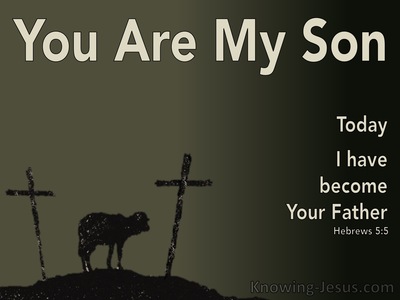◄ What Does 1 Samuel 24:4 Mean? ►
The men of David said to him, "Behold, this is the day of which the LORD said to you, 'Behold; I am about to give your enemy into your hand, and you shall do to him as it seems good to you.'" Then David arose and cut off the edge of Saul's robe secretly.
1 Samuel 24:4(NASB)
Verse of the Day
Samuel the prophet was raised up by God to bring the time of the judges to a close, because Israel lusted after a king. They rejected the Lord as their sovereign Ruler because they wanted to be like their Gentile neighbours. Israel wanted to have a democracy like the surrounding nations instead of a theocracy, where the Lord was King. It was a time in Israel's history when: "Everyone did what was right in their own eyes," and God gave them over to their evil desires.
Saul was anointed as Israel's first king by Samuel, but he quickly became proud and disobedient. His rebellious nature caused God to choose another man to succeed him. God knew that David, the shepherd-boy from Bethlehem, was a man after His own heart, and so Samuel was sent to anoint the youngest son of Jesse, in place of Saul.
God blessed David, who became a mighty warrior. David's popularity made king Saul jealous and resentful, and so this disgruntled man spent the last years of his life hunting David in the hills and caves of Judea in order to kill him and remove this threat to his kingly succession. Saul in his angry, jealous pride, was foolishly resisting the will of God.
And so it was, as Saul pursued David with 3000 fighting men into the wilderness of Engedi, he rested a while in the very cavern in which David himself was hiding! Encouraged by his own loyal servants, David crept over to the king who was in a deep sleep and secretly cut off the edge of his robe, before Saul awoke.
His men had urged their king-in-waiting to slaughter the sleeping Saul who was determined to kill David and his followers: "Behold, this is the day of which the LORD said to you, 'Behold; I am about to give your enemy into your hand.'" David was urged by his fellow fugitives: "And you shall do to him as it seems good to you."
Although he was the rightful heir to the throne, David had received no instruction from the Lord to destroy his enemy and could not bring himself to harm God's anointed king. Nevertheless, he quietly arose, crept up to his enemy's side, and cut off the edge of Saul's robe with his dagger. David silently left the cave, demonstrating that his heart was right before the Lord. David acted wisely by not taking the matter of his succession to the throne of Israel into His own hands.
Immediately after this encounter, his conscience smote David, and he shouted out to King Saul and showed him the piece of cloth that had been severed from the king's garment. David had spared the king's life, and he hoped that his action would caused Saul to repent of his bitter hatred for David. And although it caused Saul to tearfully acknowledge that his own vindictive hatred for David was unjust and that the actions of the future king demonstrated kindness and righteousness, Saul's change of heart was short-lived, and he pursued David for the rest of his life.
However, throughout the entire episode, David honoured the Lord in his actions and attitude, and no doubt he learned a valuable lesson which was to abide by God's timing, to allow the Lord fight for him and vindicate him, and to act justly and show mercy to his bitterest enemies. David learnt the importance of allowing the Lord to fight his battles and to guide his steps.
Although this little piece of Israel's history is interesting to us, it does not hold any real significance to the Body of Christ in this church dispensation, and yet there are lessons that we can learn from this interesting snippet of Israel's history. Saul painted a picture of a proud man who allowed his fleshly emotions to rule his life and permitted hatred to fester within his heart, while David demonstrated a man whose heart was right before the Lord, trusted Him in the most difficult circumstances, and allowed God to avenge his enemies.
David was a man after God's own heart who remained humble before the Lord and desired to honour His holy name. He hearkened readily to his inner conscience and maintained a trust in God's timing, even when he was encouraged to circumnavigate the plans and purposes of God or tempted to sin. He showed respect to authority figures and those in positions of responsibility.
David also showed exemplary restraint when tempted to sin and demonstrated deep devotion to God and a desire to do His will. He exhibited a reverence for His holy name, which is rare and very beautiful, while Saul allowed jealousy and hatred to rule his heart and destroy his life. There is much in this story of David and Saul that provides an example how to live godly lives and what to avoid if we are to honour the Lord.
May we learn from this great patriarch and his dealings with King Saul and seek to be men and women after God's own heart, despite the difficulties and dangers we will encounter. And may it be our heart's desire to walk humbly and trustingly before Him, all the days of our lives.
My Prayer
Heavenly Father, thank You for Your Word and the historical events that it contains, which so often sets an example of how to live a life that honours You by walking in spirit and truth, or being warned of what to avoid if we are not to fall into the trap of living in the lust of the flesh, or walking in the pride of our own heart. I pray that I may be 'a man after God's own heart,' and become increasingly sensitive to the inner promptings of the Holy Spirit, so that I may carry out Your best will and purpose for my life. May all I do be to Your honour and glory. This I ask in Jesus' name, AMEN.
Choose a Verse from 1 Samuel 24
1 Samuel 24:4 Further Study
- 1 Samuel 24:4 in the Parallel Bible
- 1 Samuel 24:4 in the Thematic Bible
- 1 Samuel 24:4 Cross References
- 1 Samuel 24:4 Treasury of Scripture Knowing
- 1 Samuel 24:4 Sermons
- 1 Samuel 24:4 Prayers
- 1 Samuel 24:4 Images
- Choose Chapter
Never miss a post















